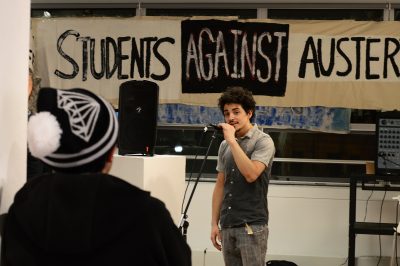
The current political climate has caused a chain reaction of think pieces, television specials and social media posts, commenting on the 2016 election and how the country will move forward. In addition to these means of expressions, the arts have taken a place at the forefront. Music, fashion, film and theater are mediums through which people have been sending messages about the current America.
“Resistance Culture: an Art Show for Revolutionaries” is a show curated by Gustavo Barceloni and Jasmine Baetz, both seniors at Massachusetts College of Art and Design. The show is used to comment on the “racist, heteronormative, patriarchal, imperialist corporatocracy” through the perspective of the proletariat.
Initial planning for “Resistance Culture” started in the fall of 2016. The presidential election and the need within the arts to be a part of the resistance became the propelling force behind the formation of the show.
“We wanted the show to open after the inauguration in the beginning of February, and it was important that we found artists outside of the school who wanted to use MassArt as a platform for their voices and resistance culture,” Barceloni said. “As artists we need to create a visual counterculture in the current history we’re making.”
The curators said they believed creating art is especially important during this time because it can provide people with information on current events and give them the means of accessing something that may be personally validating to them. It is also a chance to bring people together in various ways, they said.
“Art can build awareness by creating a space for dialogue,” Baetz said. “Art is only good and relevant if it’s elevating a diverse set of ideas and people.”
“Resistance Culture” especially aimed to build an awareness surrounding class consciousness and capitalism, Barceloni said.
“The masses of workers and those who earn a wage while living under capitalism who don’t own the means for production are the proletariat,” Barceloni said. “Since we’re living under capitalism, we need class consciousness in order to build a mass movement. When I say the ‘masses,’ I mean the one percent versus the 99 percent. There’s power behind that and artists are a piece of the puzzle.”
An art show such as this one is especially critical, given the recent focus on politics and identity in the United States and beyond, said Jojo Clifford, a junior at Pratt Institute.
“This is the most pressing issue now,” Cifford said. “Nobody has a say on what’s going on and there’s a lack of self-determination in this world, but mostly in this particular moment. History has been a lot about class struggle and what’s happening now is an indication of that.”
In addition to highlighting class struggle and capitalism, the curators said they wanted to draw attention to the contribution of student immigration movements. Barceloni and Baetz said they aimed to provide the means to support movements that exist and highlight the stories of others who need a platform during these times.
“I wish there were more people of alternate mindsets to come and be influenced by something like this,” said Zelshadai Solomon, a customer service representative at the Huntington Theatre Company. “It would’ve been nice to change people’s minds instead of having so many like-minded people in one space but I think that happens when you’re in a city of young, active students.”
Visitors said they thought an art show such as this one could help change the perspectives of those who are less accepting or who do not understand why many people have fears surrounding a Trump presidency.
“We introduced a fascist to our government and we’ve been regressing ever since,” Solomon said. “It’s only been about two weeks so making people aware through art is very important. Some of the people we admire most are artists.”
Even though it has only been a couple of weeks in a new political administration, changing mentalities isn’t out of the picture, she said.
“We look at Maya Angelou, we look at Louis Armstrong,” she said. “We look at people of color who have made major headway in fields such as music, literature and visual art and those are some of the forefronts we look to when it comes to changing mindsets.”
























































































































